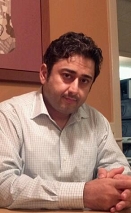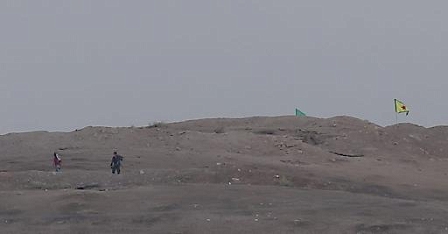Erstellt am: 15. 10. 2014 - 04:02 Uhr
Assads größter diplomatischer Triumph
IS, Syrien, Türkei
Seit einem Monat wird um Kobanê gekämpft. Die kurdisch-syrische Stadt an der Grenze zur Türkei ist von drei Seiten umstellt. IS-Terroristen sind schon vor Tagen ins Stadtgebiet eingedrungen und kämpfen mit Panzern und Granatwerfern gegen die Kurden, deren Volksschutzeinheiten (YPG/YPJ) nur über leichte Waffen verfügen. Das Voranschreiten der IS konnte durch Luftangriffe der US-geführten Anti-IS-Koalition zuletzt zwar verlangsamt werden. Andererseits ist die Stadt immer noch von jeder Versorgung abgeschnitten - die Türkei hält ihre Grenze zu Kobanê geschlossen, Flüchtlinge und verwundete Kämpfer können zwar noch (vereinzelt - die Lage ändert sich stündlich) hinaus, freiwillige Kämpfer, die sich den Kurden in Kobanê anschließen möchten, werden aber nicht hineingelassen. Außerdem geht den Kurden langsam die Munition aus, in Aufrufen bitten sie um eine Aufhebung des Embargos bzw. den Abwurf von militärischem Equipment und Versorgungsgütern.
Mit einem Sicherheitskorridor rund um den ebenfalls heftig umkämpften syrisch-tyrkischen Grenzübergang könnten Zivilisten aus der Stadt gebracht werden, doch dagegen wehrt sich die Türkei. UN-Generalsekretär Ban Ki-Moon warnt vor einem Massaker, sollte Kobanê fallen. Dies würde auch umliegende Dörfer unter IS-Herrschaft betreffen, deren Bevölkerung von den Terrormilizen wegen deren Konzentration auf die Eroberung der Stadt zwar momentan "in Ruhe gelassen" werden dürfte, die aber spätestens nach einem Fall von Kobanê ebenfalls um ihr Leben bangen müsste.
#Kobane protest in Dusseldorf pic.twitter.com/cBUMzRbjXX
— Güçlü Yaman (@GucluYaman) 11. Oktober 2014Hintergründe
- "Öl ins Feuer": Türkei bombardiert PKK-Stellungen
- "Türken gegen Kurden gegen Kurden": Der Kampf gegen den IS spaltet die türkische Gesellschaft
- "Gefährlicher Irrsinn": EU-Länder finanzieren IS durch Ölimport
- The Freedom Fight Has Returned to Turkey As Kurds head to the front lines to fight the Islamic State, they face a Turkish government attacking them from the rear.
- Das Who's Who der Assad-Gegner
- "Türkei wird nie gegen IS kämpfen" PKK-Vorsitzender warnt vor Ende des Waffenstillstands mit Ankara
Immer wieder landen IS-Granaten auf türkischem Boden und werden von der dortigen Armee, die abgesehen davon nicht ins Geschehen eingreift, sichergestellt und beseitigt. Die in Kobanê kämpfenden YPG/YPJ-Einheiten gehören der regional bestimmenden kurdischen "Partei der Demokratischen Union" (PYD) an - die ihrerseits der PKK nahe steht, die wiederum auf US- und EU-Terrorlisten steht. Zu Unrecht, finden die Kurden, die Zeiten des Terrors seien vorbei und die PKK mittlerweile eine gemäßigte Kraft, auch habe man sich zuletzt ja in einem Friedensprozess mit der Türkei befunden. Unterdessen haben türkische Kampfflugzeuge begonnen, Stellungen der PKK im Südosten des Landes zu bombardieren. In der Türkei ist die Lage also äußerst zugespitzt, an den "Friedensprozess" mit den Kurden (15 Millionen alleine in der Türkei) glaubt derzeit kaum jemand - bei Protesten und Ausschreitungen sind in den letzten Tagen 37 Menschen ums Leben gekommen.
EPA
Interview
Schon letzte Woche habe ich mit dem Kurdish Affairs-Experten Mutlu Çiviroğlu gesprochen und ihn zur militärischen Unterlegenheit der Kurden in Kobanê und zur Rolle von Türkei und Syrien-Machthaber Bashar al-Assad befragt.
Doesn't the Turkish administration itself fear to be overrun by ISIS? Or do they think they could form some kind of "informal bond"?
Mutlu Çiviroğlu: I think they are confident that ISIS is not going to act against them or overrun them, which I think is a very very wrong calculation. I do not believe in that, because the stronger ISIS gets, the more manpower it receives, the more it does not recognize anything.
After Mosul fell, thousands of people joined (ISIS). The more territory is added, the more fighters are added, the more danger grows for the globe, for the international community. So, who can guarantee me they are not going to attack Turkey?! How can you be sure? It shows that the allergy that Turkey has against the Kurds is very strong - that is why Syrian Kurds say, Turkey favors ISIS over Kurds, that is their perception.<<
#Kobane battle NEW MAP on Oct 14, 2014 : slow advance of #IS in city center #Kobani pic.twitter.com/yGDsKnBNc4
— Agathocle deSyracuse (@deSyracuse) 14. Oktober 2014Let's take a closer look at the Kurdish territory (in Syria, that they call "Rojava") itself. What is special about that autonomous region, about the way that people set up their own administration throughout the last two years - in terms of equality and religious tolerance?
Mutlu Çiviroğlu: What Kurds have achieved is dynamite to what ISIS is standing for. Kurds are tolerant people: within Kurdish society, they have multi fate.

Mutlu Çiviroğlu
Mutlu Çiviroğlu is a US-based Kurdish Affairs analyst focusing on Syria and Turkey. Also Kobanê Expert. Mutlu on Twitter
The "Rojava"-model could have been a model for entire Syria - the people have been living relatively peaceful. There are Arab units within the YPG, the Cezire canton's head is an Arab and his co-chair is a woman. So imagine, in Syria, in the middle east, you have a Kurdish administration whose head is an Arab and the other head is a woman. In Efrîn canton, the head of the canton is a woman and in Kobanê, the head of public council is a woman, too. In top positions, there are Arabs, Syriacs, Christians - when this is the case, you see how tolerant and accepting Kurds are.
"PKK units are widely credited w/ engineering the rescue of thousands of Yazidis who were trapped on Mount" http://t.co/U5ky7j2Fv6 @nytimes
— Cagil M. Kasapoglu (@CagilKasapoglu) 13. Oktober 2014Die jetzt Kobanê verteidigenden PKK-nahen YPG-Kämpfer waren es auch, die im Sommer im Irak einen Fluchtkorridor für tausende Jesiden freigekämpft haben. Ebenso sind sie den Peschmerga-Kämpfern im Süden beigesprungen, als die im Irak gelegene Kurden-Hauptstadt Erbil in Gefahr war.
Why does the West seemingly "want" to be denounced by IS? Aren't they attacking Kobanê to kind of put the hole West in a diplomatic dilemma?
Mutlu Çiviroğlu: From what I see it looks like they just say, "as long as it's not on my backdoor step, I don't care". But remember: Germany was attacked, Spain was attacked, London was attacked - and who is guaranteeing that Austria is not going to be attacked? The more cities, the more new territories are seized (by IS), this becomes an "inspiration" for many people around the world. So, the West should wake up. If YPG is defeated, if Kobanê falls, that is gonna blow all efforts against ISIS, and it's going to be a huge moral support for ISIS.
How did this YPG-FSA-coalition come about?
Mutlu Çiviroğlu: In August, one of the most famous FSA commanders visited YPG and asked for their help because it is disciplined, well-structured, effective and motivated. Later on, the groups north of Aleppo and around Kobanê signed a joined front called Euphrates Volcano and they are trained by YPG.
They are the secular FSA - FSA has never been "one group" - these people that they (YPG) are collaborating with, according to YPG, are the people who respect the Kurdish people's existance, who are supporting secularism and who are open-minded. So this collaboration is still ongoing, but it is not acknowledged.

EPA
What is Assad's role right now? Is he solely a winner or is he also fearing ISIS getting bigger and bigger?
Damals im August
- NZZ.ch: "Nicht der Einsatz der Amerikaner, sondern jener der syrisch-kurdischen Guerilla YPG, ein Ableger der PKK, hat Tausenden von Jesiden am Wochenende die Flucht aus den Sinjar-Bergen ermöglicht. Mitglieder der YPG kämpften einen Korridor frei, über den die Flüchtlinge nach Syrien entkommen konnten."
- Deutsche Welle: "200.000 Jesiden, die vor den islamistischen IS-Terroristen flüchten"
Mutlu Çiviroğlu: I think Assad's biggest diplomatic achievement is bringing him back as "the best alternative for Syria". Assad had been supporting ISIS - ISIS could not have been this strong without the help of Assad. He supported all extremist fractions and turned a blind eye. There was much criticism from Syrian National Coalition, from YPG and from activists on the ground that ISIS has never received any strikes from regime forces and in some points ISIS transports its heavy weapons in front of Assad checkpoints - they just let them go. Assad's policy was, "I am going to support these radical fractions and international community will come to the point where they say, okay, Assad is still better than them" - and he achieved that.
Weiterlesen
- "There are no weapons to stop this": Interview with Mutlu Çiviroğlu, pt. I
- "Es droht ein Massaker"- Der Kobanê-Verteidigungschef im Telefoninterview
- "Notfalls lachen": Ein IT-Spezialist in einem Pfefferonifeld und was das mit dem Kampf um Kobanê zu zun hat
- "Kampf um Kobanê: Hintergründe und inner-kurdische Konflikte


